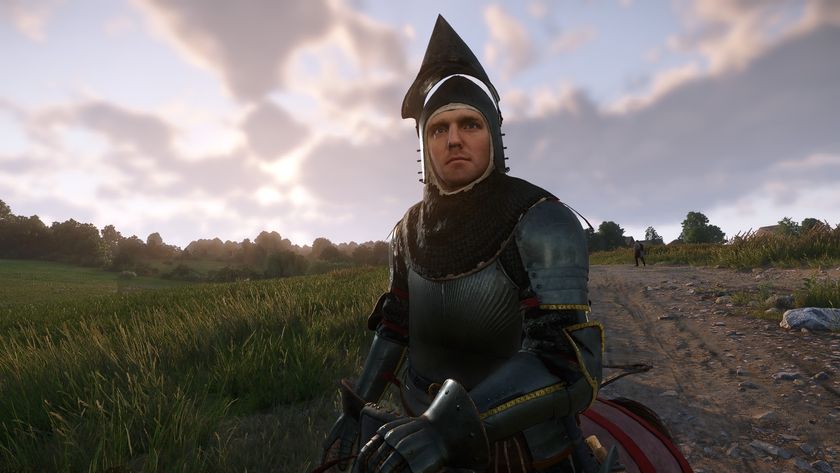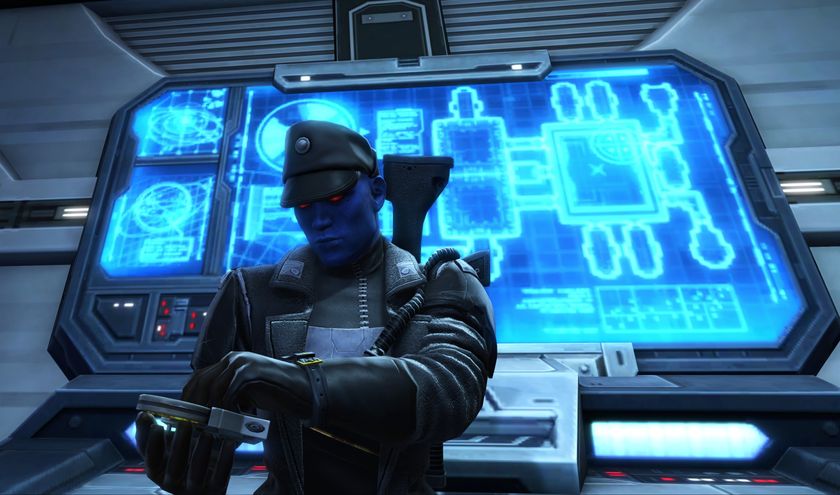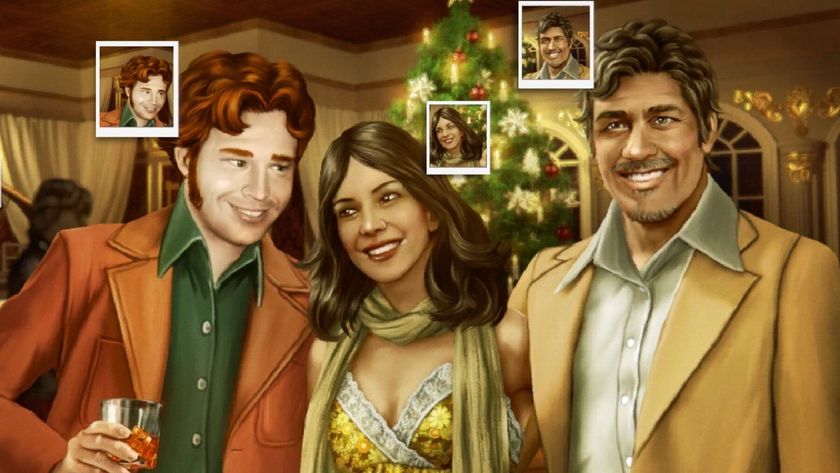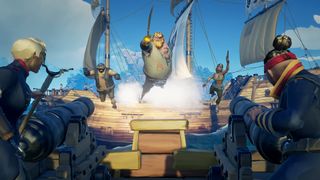
One of the most common critiques leveled against games is that they 'need more content.' Sea of Thieves is the latest to take that flak, joining other big, open-ended games such as No Man's Sky and Destiny 2, which have also been accused of 'not having enough.' But what do they not have enough of? 'Content' can literally be anything, as can 'things to do,' so we've gathered some of our open-world aficionados to discuss what we're really saying when we talk about 'content' and our insatiable need for more of it.
Tyler (who reviewed Sea of Thieves), Chris (who just finished reviewing Far Cry 5), our MMO and EVE Online expert, Steven, and our resident Destiny 2 apologist, Tim, discuss below.
Tyler: Sea of Thieves is the sort of game I dreamed about back when Bolo was the height of networked multiplayer, and I'd have lost my shit back then if I'd somehow learned that A) such a game would exist in the future, and that B) people would be saying it 'sucks because there's not enough content.' But here we are, and I do intuitively understand the criticism, even though I think it's terribly vague.
Chris: I think 'content' can mean a few things. For one, a big variety of distinctly different things to do. I really like Sea of Thieves, but I can still recognize that beyond treasure hunts, fighting players, and killing skeletons, there's not much besides sailing around. I happen to really like sailing around, scrapping with other boats, and digging up treasure (not as big a fan of fighting skeleton waves), so that's kind of enough for me.
For No Man's Sky, I feel like procedural generation is counted on to always provide interesting discoveries, but it really didn't. Just because everything you see is slightly different doesn't mean it's exciting, and after a while you begin noticing that it's the same parts and pieces being used in different combinations. Flying around becomes less satisfying and you start wanting more to do.

You fly for the sake of flying or sail for the sake of sailing, and once the novelty of those activities wears off you're desperately wishing for something new
Tyler: It's completely contextual, though, right? Rocket League, which I've played over 350 hours of, has very little 'content' when you strip away all the cosmetic stuff. It's always whacking a ball (or puck) around, and that's far fewer 'things to do' than sailing, fighting players, and hunting for treasure. But no one complains because the 'content' of Rocket League is 'getting better at it.' I think what happens with Sea of Thieves and No Man's Sky-type games is that the framework is 'adventure' more than competition or improvement, so 'content' becomes 'I should be seeing and doing new things all the time.'
Steven: I also think the 'why' really matters here. People play EVE Online, which is a game where you can spend four hours doing absolutely nothing but sitting somewhere and waiting for something to happen, but they do that because those moments coalesce into a larger narrative that is, ultimately, meaningful to them. But games like Sea of Thieves and No Man's Sky don't really have a greater purpose. You fly for the sake of flying or sail for the sake of sailing, and once the novelty of those activities wears off you're desperately wishing for something new. It's a shame because, like EVE Online, Sea of Thieves is fundamentally a sandbox game, but there's just not a lot of sand in that box. If there were more conflict drivers inspiring you to interact with other players in exciting ways and more ways for players to build a compelling narrative out of those high-seas adventures, I could see the game being a smash hit.
The biggest gaming news, reviews and hardware deals
Keep up to date with the most important stories and the best deals, as picked by the PC Gamer team.
Tyler: I'm pretty sure it's a hit anyway! But that's a good point.
Tim: Please can we disable the comments on this article because I'm about to talk Destiny.
Tyler: No, but I'll wait until you're out of the office to publish this.
Tim: I logged north of 2,000 hours in the first game (which itself drew criticism for content droughts of Saharan proportions), and am one of the few people still plugging away at the sequel on PC (where the problem is even worse). To my mind, Destiny 2's fundamental issue with lack of content isn't that there aren't enough missions, or destinations to visit, or even types of activity. It is that there is almost no reason to run any of it now. What unifies most of these games is that they're fundamentally about building some sort of collection—usually by acquiring and upgrading loot—and that system needs to have oceanic depth to keep players coming back. In Destiny 1 that meant giving guns random rolls so that each drop would potentially have a tiny chance of a god tier combination of perks. The sequel did away with that system in favour of fixed rolls—largely because a bunch of babies complained about grinding for the very best guns—which it turned out was no sort of replacement at all. I must have acquired and auto dismantled every weapon in D2 a dozen or more times over now, and it's robbed me of much desire to keep going. Bafflingly, Bungie knew this was going to be a huge issue and shipped the game without an answer. To bring the conversation back to Sea of Thieves, the fact you can't get a better cutlass or collect a sweet flotilla of increasingly flashy ships seems like a massive and obvious problem to me.
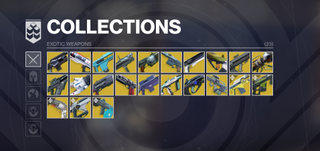
Tyler: It seems to me that 'content,' then, is the ability to set lots of short-term and long-term goals (the 'why'), and to be surprised (have intrinsic fun) in the process of achieving them. In Destiny 2, the big goal is collecting stuff, and when you run out of stuff to collect, the 'not enough content' complaints come in. And with that definition we can see why it isn't a problem in Rocket League, where winning each brief match is a short-term goal that's full of surprises—eg, the final score, weird bounces, moves I didn't think I was going to pull off—and getting better is the long-term goal, to which there's no end (players are still showing off skills I haven't seen before in the subreddit). And in EVE, you've got your eye on a new ship, so even boring-ass mining is working toward something, and then there are all the big goals you mentioned, Steven.
Steven: Yeah, to expand on that just a wee bit, in EVE you're also working towards communal goals. It's not just about you, but what you can do to help achieve success for your corporation. All of those are powerful motivators that keep people invested.
Tyler: As Chris hit on earlier with regard to Sea of Thieves, when you first start playing there are loads of sub-goals to work toward such as learning how to sail, sinking your first ship, exploring islands you've never seen. Those first five or so hours are great. But once you figure out the game, the rate of achievement falls off a cliff, and there are only a few short-term goals left: go get some treasure (with a few simple methods) and sell it, or fight another player ship (usually just because). The only long-term goals are to buy cosmetic stuff and reach a vaguely-defined 'endgame,' as 'getting better' isn't something I'm all that concerned with. I really enjoy the relaxed pace of Sea of Thieves, but that's when players start saying, 'Well, this game doesn't have enough content.' It comes from that drought of goals.
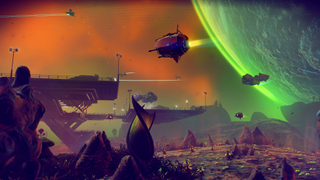
Chris: I also kind of feel like price has become this bar against which games are judged. NMS took a lot of extra flak for being priced at $60, which is seen as an 'AAA price.' Sea of Thieves is the same, and I see a lot of comments saying "This is a $40 game" or "This is a $30 game." We've come to expect full-priced games to be stacked with stuff even though games like NMS are built by a comparatively small team.
Tyler: That's definitely an issue. What you're buying with Sea of Thieves is a marvelous pool of physics—those waves are just brilliant, and co-op sailing is always pleasant to me—and a framework for PvP battles which I think are super fun. But $60 is a lot to spend, and people are thinking, 'Well, for that price I can get Far Cry 5, and it's full of all these mo-capped characters and bears are gonna attack me, and I can go fishing and fly a helicopter,' and so on. I love Sea of Thieves but I can't argue with bears and helicopters.
Tim: A big factor that runs through all these 'live' games is the core fantasy on which they're sold. Take a look at the first Destiny game's E3 reveal and the players are mindblown when this sweet-looking spaceship swoops in and drops off a tank to fight as part of a public event. And of course it is cool the first time you see it, but when you've seen the same event literally thousands of times and can in fact set your clock by it, the fantasy of being in this dynamic world dissolves.
Tyler: Yeah, our own imaginations totally outpace what's actually possible, because these games are open-ended prompts ('live in this world') rather than codified genre-games, where your expectations don't exceed other examples of the genre.
Tim: It's easy to pick similar comparisons with games like No Man's Sky and Sea of Thieves, where the core fantasies—Explore the infinite depths of space! Be a completely freeform pirate with your friends!—are so evocative, that whatever actual slate of content those games end up launching with inevitably feels anemic compared to what players imagined it might be like. The exception is something like EVE, which is able to keep surprising the audience because its vast scope and robust systems that enable the kind of weird, funny, scary emergent stories that Steven writes about on the regular.
Tyler: To play armchair designer a bit, if that's almost always going to happen when these sorts of games are pitched, how do they address it?
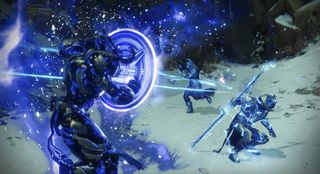
Sinking endless cost into keeping players as busy and engaged as possible seems to be something they deemed a diminishing return.
Tim: I mean, I question how much they care to a degree. Bungie took payment for Destiny 2 and its DLCs from most players up front. Sinking endless cost into keeping players as busy and engaged as possible seems to be something they deemed a diminishing return. But I think the short, patronising, answer is these games need to find ways of injecting new stuff on a close to weekly basis. For Destiny the best example of that was the Black Spindle mission, which was hidden at launch and only uncovered some time later when a time gate swung open to reveal this brilliant secret challenge which awarded an awesome weapon. I think balance can play a part too. D2 went something like six months with no nerfs of buffs, leading to an unbelievably stale meta. For all these games, I think the answer to to build an engine and workflow that its tuned towards regular, small updates, so the developer can keep delighting players. Procedurally driven content, as per The Division's Underground mode, and user-created stuff, like Halo's Forge World, also have the potential to take some pressure off the studio having to constantly create time-consuming new assets.
Tyler: New, surprise events could obviously help Sea of Thieves, but I think there's a structural problem with it. The only difference between you and anyone else in Sea of Thieves is how 'good' you are at it, how long you've played, and how you show off your success with cosmetics. I like the boldness of that decision, but opportunities to test your skill (fighting other ships) are fairly rare, whereas Rocket League and CS:GO—which operate on the same principle of skill and cosmetics—are always all about showing off skill and learning new moves and practicing cooperative tactics. A couple probably-bad potential solutions: increase the complexity of ship battles ('moves' to learn) and include a combat-only arena mode, or scrap the idea that pirates are all the same and let players work toward functional upgrades like you suggested, Tim. I have no idea how you'd successfully do either of those things, but as it is, I feel like I'm in stasis: neither working toward the long term goal of 'getting better' at ship battles (and I'm not sure how much better I can get as it is now) nor working toward earning some fun new toy, like a new gun in Destiny 2.
Chris: No Man's Sky has added a lot in the last year to give players more to do: base building, terrain editing, new mission types, additional story elements, new vehicles, and the ability to explore with other people, sorta (other players are represented by floating orbs). The changes are good ones, and most of them come from direct player feedback about stuff they really wanted. But the structure hasn't changed, and neither has the somewhat disappointing core of the experience. Some new planet types briefly made exploration exciting again, but once I'd seen them I was left with the same opinion about the game as I originally had: the procedural generation just doesn't create enough mystery and wonder to keep me going. It's great there's a lot of new stuff for players to do, but simply adding gobs of 'content' doesn't fix what's broken.
Tyler: Yeah, exactly. That's why we need to be specific when we talk about 'content.' Rare could add ten new events like the kraken to Sea of Thieves, and that would create ten new goals—see each new thing. And then what? They just brute-force add new goals as fast as players can achieve them? That does constitute 'adding more content', but even though it would be welcome (fishing minigame please) it doesn't truly solve what players are complaining about and isn't sustainable. What we're looking for are short-term goals to achieve on the way to exciting long-term goals, and that's as much 'content' as it is 'the design of the game.'
The collective PC Gamer editorial team worked together to write this article. PC Gamer is the global authority on PC games—starting in 1993 with the magazine, and then in 2010 with this website you're currently reading. We have writers across the US, UK and Australia, who you can read about here.
Most Popular








